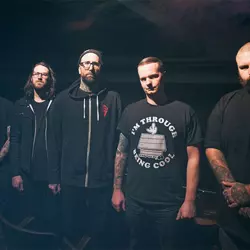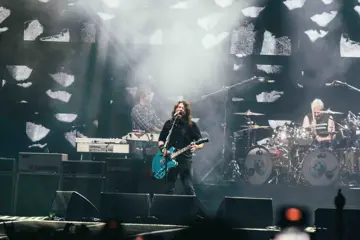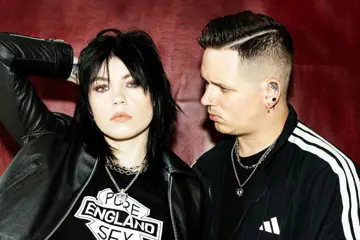 The Acacia Strain
The Acacia StrainThe Acacia Strain have by now achieved veteran status in whatever the fuck metal/hardcore sub-genre you want to classify them as. Deathcore, metalcore, hardcore, sludge, whichever! For a band that has been around for as long as they have now - nineteen years for those counting - they have remained extremely consistent with their releases over the past few years, dropping great album after great album. Last year’s experimental doom-metal LP, ‘It Comes In Waves,’ proved that Acacia Strain won't just be a one trick pony, and that they do possess the capabilities necessary to write something truly outside of their own box. But that was only the beginning for this new era of the band. Only a short two months after the release of ‘It Comes In Waves,’ The Acacia Strain started unveiling their new full length, ‘Slow Decay,’ in the form of a series of conceptual two-track EPs. While this release was more of the usual chugging and breakdown style the band is so well-known for, especially in contrast with its predecessor, the quality has remained as consistent.
One of the driving forces behind the band’s recent material is long-time guitarist Devin Shidaker, who has been helping with the songwriting duties since 2013. Devin is an incredibly reliable guitarist who has always had a unique ear for writing songs, culminating into some of the band’s finest albums. I mean, we’re talking about one of the dudes who wrote my favourite album of all time, 2014’s ‘Coma Witch.’ (Judge me if you must but I do not fucking care; that album rules!)
So, obviously, I was quite ecstatic to get the opportunity to chat with Devin, and started thinking of the million or so questions I could ask him. However, if I could ask this guy every single question I’ve ever had for him, this interview would see no end. With that in mind, here's the curated list of queries I had for the guitarist. I hope you enjoy.
Thank you for taking the time to do this interview with me, Devin. The Acacia Strain have been my absolute favourite band for over six years now, so this is a really awesome opportunity for me. I want to start at the beginning. For some reason, many people don’t know this, but you actually played guitar in Oceano for a bit before you joined The Acacia Strain. How did you get the opportunity to join TAS, and were you a fan of the band beforehand?
Don't miss a beat with our FREE daily newsletter
Thank you for the kind words, Hunter! Yes, prior to joining The Acacia Strain, I played guitar for Oceano, appearing on their Contagion record in 2010. I was with them right up until I joined The Acacia Strain in 2013. I have been a fan of TAS since I was in high school. I regularly listened to 3750 on my way to school, and I got to actually see them for the first time in probably 2006 or 2007 in Cleveland when they were touring in support of The Dead Walk. Seeing TAS at that point in time blew me away, on top of being very tight live, they had energy that I just didn’t see from other bands at the time. From then on out they became a major influence for me in terms of the kind of ferocity I wanted to put forward with my own music.
Oceano and TAS had toured together a few times, even sharing a bus for an entire tour once in 2012. Shortly after the van flip at the end of 2012, Tony Diaz, who was filling in on guitar, decided it was time to focus on his own music, and TAS needed somebody to fill that role. The band’s manager at the time, Scott Lee, reached out to me to see if I was interested in coming in, but I told him I was unwilling to quit my own band to be a fill in. If I was going to play with TAS, I needed to be a real, full time, contributing member. Shortly after those few conversations, I was on my way to Holyoke, MA, to start rehearsing with the guys. TAS had also brought in Richie Gomez, formerly of Molotov Solution, to play guitar as well. After only a few shows, we wrote the Above/Below EP, and things have only been moving up from there.
You have been in the band for a few album cycles now. I’m sure you have had a fair deal of input in the songwriting behind these records, especially the couple that were written and recorded before Tom and Griffin joined the band. How would you say your songwriting style and own personal tropes have evolved over the years, from ‘Above/Below’ up to now with ‘Slow Decay?’
When I joined, the most important thing to me was to be able to write music that sounded like TAS, while at the same time being different, if that makes sense. I didn’t want to come in and rehash things that the band had already done. We had a chance at a fresh start and I think we ran with it. I brought in a lot of doom elements that I had been wanting to play around with for a long time, exploring how an extended range instrument can make you feel, instead of just blasting out drop F chugging. The caveman riffs are still very important, but I like to think that when you have some other stuff going on, it makes those shine and stand out, instead of just being an onslaught of beatdown after beatdown. When I was writing with Richie, we had a pretty solid back and forth with writing; he brought a lot of technicality from being in a band like Molotov Solution that worked really well with us, especially since Kevin is such a versatile drummer who can seamlessly bridge the gap between technicality and groove. After Richie left, Griffin and I were left to write all of the guitars for Gravebloom ourselves, and while it was a challenge, I think we rose to the occasion and wrote some of our strongest material to date. Gravebloom made us step a little bit outside of our writing comfort zone as we didn’t want everything to sound like it was written by one guitarist, and I think that helped to open the doors creatively to things we have written since then.

It’s no secret that you are the mastermind behind a lot of the doomier tracks that the band has been introducing ever since 2014’s ‘Coma Witch.’ This style is very different sounding than a lot of the things that other bands in these genres are doing, making Acacia Strain stand out as unique and creative. Can you tell me a bit about some of the bands or records that have influenced this style of songwriting?
I love doom, I love sludge, I love anything that is slow and painful to listen to. I like to bring those influences into my own writing, hopefully without blatantly ripping anyone else off. I think a big reason that it works for me is that I generally do not listen to a lot of the bands we get compared to as far as “genre” goes. It’s nothing against those bands, and I enjoy playing with them, making friends with them, and watching them live, but there are a lot of modern “heavy” bands that just don’t do anything for me when it comes to my own musical tastes. I’m a pain in the ass when it comes to listening to music, it really has to make me FEEL something for it to stay in my rotation. A lot of my writing influence comes from bands like Warning, Bongripper, Crowbar, Sleep, 40 Watt Sun, Bell Witch, Morbid Angel, Obituary, Esoteric, Sumac, Integrity, Celeste, Neurosis, Pulling Teeth, and many, many more. Some of these influences really shine through for me because personally, it’s more important for me to create the music that my body and mind want to create, and not necessarily what I think somebody else wants to hear. I think that when you start writing music with the main goal of pleasing others and selling records, you tend to lose the authenticity and fire that existed when you first picked up your instrument, when all you wanted to do was play and create. It’s incredibly important to never lose that fire, because it’s obvious to everyone when it happens.
I’d like to talk a bit about the new material and this whole new era of The Acacia Strain. Much of the TAS fanbase has come to a sort of agreement that the current era of the band is possibly the best version of The Acacia Strain that has ever existed, with these ‘Slow Decay’ songs, and even the highly experimental and brilliant ‘It Comes In Waves’ being among the best material the band has ever released. How does it feel to have such fresh material that is so widely embraced by the fans this far into your career? What do you think led the band to this point over the course of these last few years?
It’s a great honor to have anyone consider our current lineup to be the “best”. I try to never be in competition with past members, or other bands, and I try not to “top” anything I’ve already written. That being said, it feels good to be with a group of people who all have the same mindset, that we create what we want to create, and if people like it, that’s awesome. If people don’t like it, that’s fine too. With this lineup, I think every single member has become jaded in their own ways with different aspects of the music industry, with how “things are done”, and I think that our current music is a culmination of those feelings. It’s our way to say “fuck it”. We can put out a surprise 30 minute experimental doom record that’s all one track, and then a few months later we can begin releasing a completely different sounding record, two tracks at a time over several months. There are no rules, and we are proving that. We were all on the same page with how we wanted to do this, and we didn’t second guess ourselves with any of it. I think that is the attitude that TAS has needed for a long time in respects to songwriting. We have already been a “fuck the rules” kind of band in a live and lyrical setting, but now I think that mentality has finally transcended into our music as well. There are no rules and we will be doing what we want from here on out.

Outside of ‘It Comes In Waves,’ The Acacia Strain has pretty much exclusively recorded every record since 2013 at Graphic Nature Audio up in Belleville, NJ. However, up until ‘Slow Decay,’ it’s been with Will Putney. What made you guys decide to record with Randy LeBoeuf this time around? What was different about that studio experience with Randy?
We have a strong history with Randy. Whenever we have recorded with Will, Randy has been right there with him, as well as Steve Seid (who handled the mix on It Comes In Waves), and Tom (our guitarist, who used to work at Graphic Nature). We recorded Slow Decay in Des Moines at Griffin’s studio, with Randy at the helm, helping us solidify structures and add the final touches to our songs. Randy absolutely blew me away, never before have I worked with somebody with his level of understanding on what we wanted to do. Randy slept at the studio with us, he woke up with us, we started at the same time every day, and we kept a pretty good pace with everything. It was refreshing because I’m used to recording in situations where I’m ready to start recording at 10AM, and then nothing happens until 2-3PM. For some people, that kind of looseness works well, but I like to be a little more regimented than that, and working with Randy was amazing in that aspect. It truly felt like having a 6th member of the band, and I know that’s a feeling we’ve never truly had before. I can not wait to create more with him.
I'd love to dig into the process of how you guys work together. As The Acacia Strain has had a pretty unique songwriting situation recently, now having three different people writing the music behind these albums. How did you, Tom, and Griffin go about collaborating on both ‘It Comes In Waves’ and ‘Slow Decay?’
Working with Tom and Griffin on music has been such a great experience. We all bring very different things to the table, and they blend together perfectly in my opinion. When we first got into the studio for Slow Decay, we still had a few ideas we wanted to flesh out, so we set up three different writing stations, where we could each work on our own. Being that we were in the same studio, we were able to easily jump in on each other’s sessions to add in our own ideas or give thoughts on things that could change, as well as offering encouragement when something was on track to be really fucking cool. Griffin wrote the first few riffs to Seeing God, which I think are some of the coolest riffs we’ve ever had as a band, but afterwards was a little stumped on where to go from there.
Because of how we were set up, Tom was able to jump in and say “let’s try this” and helped put together something awesome. That process went on for all of us, and I hope we can continue to write that way in the future. It Comes in Waves was similar in some ways, but was done in a very guerrilla way, where we were writing and recording parts when we could in green rooms and in AirBNBs across the country. Griffin handled the bulk of the structure while sitting in the van. There must have been two entire tours where Griffin spent every single hour in the van on his Macbook working on the structure. It was a lot of work, but it paid off.
The marketing and rollout of the band’s new music has been entertaining to watch unfold, with ‘It Comes In Waves’ being surprise released without warning the day after Christmas, and ‘Slow Decay’ being split up into a series of five conceptual EPs. What inspired this shaking up of the usual release formula? Were you guys getting a bit bored of the age old and overdone “2-3 singles and pre-orders” method? Or did COVID affect this approach?
I think the biggest factor going into our release decisions for the last two releases has been the prevalence and domination of streaming over all other methods of listening to music. First week sales aren’t important like they once were, so there’s no reason to stick to “traditional” methods of building hype for a release date that will come, go, and then be forgotten. It Comes in Waves was an experiment, and we figured we would experiment with a surprise release as well. That experiment worked well for us, and the reaction was great. With how different that record was, I think it would have been a mistake to promote it like a traditional release, because it gives people a chance to create expectations in their minds, and when those expectations aren’t met, they don’t like the record. There were no expectations for It Comes in Waves, and I think that played a huge role in us getting the positive response that we did when it was released.
With Slow Decay, we had a somewhat similar approach, but also threw in an idea that Griffin had about releasing a series of 7” records instead of just plopping out a full length. Splitting them up this way has helped the release in a few ways: First, it lets every single song get attention; there are no b-sides, no filler tracks. Second, when new songs come out every month, you go back and listen to the previous releases to see how they fit with each other, making it more likely that those songs become favourites. Third, with the spread out release, you keep your music in people’s heads for a longer period of time than just that first release week, and I think that helps to give the listener something that they will be able to enjoy for a long time. Believe it or not, none of our plans were based around the COVID-19 pandemic, it just kind of fell in place that way.
One big thing that I’ve noticed with the tracks on ‘Slow Decay’ is that this release is less atmospheric and more in-your-face heavy, with a lot of the cuts sounding much more hardcore-influenced than usual. Was this something that you guys consciously decided on when writing the record, or did it just naturally come out that way?
This was definitely a conscious decision. We knew with the release of It Comes in Waves, that people would assume that we had changed out sound, and that we would now be releasing music that sounded like that record. Slow Decay was a conscious effort to say “we will do what we want”. It’s our way of letting everyone know that there is no “one sound” that describes The Acacia Strain. We can write a doom record, we can write fast hardcore or death metal influenced songs, we can do whatever we want, and we will continue to do so for as long as we can.
‘It Comes In Waves’ was an extremely surprising change of pace for the band, being the most out-there piece Acacia Strain has released. For how different it was, it was surprisingly extremely well-received by nearly the entire fanbase. Many, including myself, are hoping that this wasn’t just a one-off project. Do you think that kind of experimental release between albums would be on the cards in the future?
There’s no telling what our next release will sound like, but with how much fun creating It Comes in Waves was, I definitely see us experimenting more in the future. We will never try to recreate or “top” that record, but I’d love to see where we are at creatively in the next few years.
Obviously, with the current state of the music world amidst this pandemic, live shows might not be happening until later this year or even next year in America and other parts of the world. Regardless, which songs from ‘Slow Decay’ are you most excited to bring out to the live setting?
I can’t wait to be able to play shows again. Honestly, this is a really difficult question, because I really want to play every song from this record live. I think one song in particular is going to be a great live song, but nobody has heard it yet at the time of this writing.
I usually end my interviews with some sort of “what are the band’s plans for the future” type question, but given this dumpster fire of a year, that question can go fuck itself. Instead, I’ll let you finish with whatever sentiment you'd like to close on and let you get on your with your day. Thank you for your time!
I hope that our country and our world has a future, because this year has absolutely been a dumpster fire. We will see what happens, but if the end is coming, I’ve had a good ride, and I’ll see you all in hell. Thanks for having me!
















